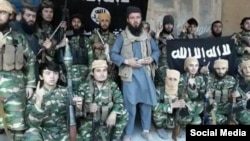Five and a half years after the Global Coalition to Defeat ISIS and its local partners eliminated the threat of ISIS in Syria, the terrorist group has once again resurged in Afghanistan as well as in West Africa and the Sahel, according to Vladimir Voronkov, UN undersecretary-general for counter-terrorism. In Afghanistan, Islamic State in Iraq and the Levant-Khorasan, or ISIL-K, “has improved its financial and logistical capabilities in the past six months, including by tapping into Afghan and Central Asian diasporas for support.”
At the same time, he noted that ISIS West Africa Province and Islamic State in the Greater Sahel are consolidating their areas of operations. “Should these groups extend their influence in northern littoral States, a vast territory stretching from Mali to northern Nigeria could fall under their effective control.”
“The United States shares the … concern regarding ISIS-Khorasan’s ability to conduct attacks outside of Afghanistan, as we saw with the horrific terrorist attacks in Kerman on January 3 and Moscow on March 22 that resulted in hundreds of deaths,” said Robert Wood, U.S. Alternative Representative for Special Political Affairs at the U.N. “Similarly, we remain particularly focused on the terrorism threat across Africa.”
“We continue to provide our African partners essential assistance in degrading the capabilities of and countering ISIS and al-Qa’ida affiliates, in a manner consistent with international law. Capable law enforcement and broader security service responses are vital to preventing and countering terrorism and violent extremism,” he said.
“Sexual and gender-based violence is a strategy that terrorists use to further their nefarious aims, which was recognized in Resolution 2734 as a potential ground for sanctions listings.”
“Promoting accountability for conflict-related sexual violence is a priority for the United States,” said Ambassador Wood.
“Resolution 2734 is a critical step forward for the global campaign to end gender-based violence. We encourage the Security Council and Member States to nominate individuals, including terrorist operatives and facilitators, to be sanctioned for committing or enabling these types of offenses.”
“The fight against terrorism requires comprehensive efforts beyond security-centered approaches,” said Ambassador Wood. “The international community must continue investing in whole-of-society approaches that respect human rights and the rule of law, in order to effectively prevent and counter the spread of ISIS and other terrorist groups.”






